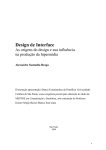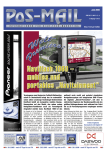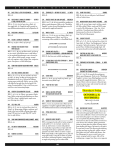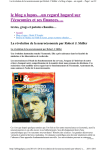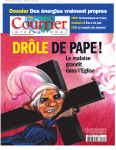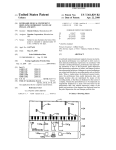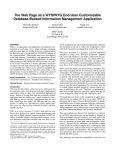Download Wiley Presentation Secrets
Transcript
Index B AL TE MA D TE GH RI CO PY acts, in story, 76–79 climax, 77 development, 77 exposition, 76–77 inciting incident, 76 recapitulation, 77 rising action, 77 Adams, Scott, 189 advertising, villains in, 67–68 aesthetics, in slides, 164–165 featurism, 164 purpose, 165 usability and, 165 Wabi-sabi, 195 agenda slides “Death by PowerPoint,” 94 exposition, 85 AirPlay, 17 AirPrint, 17 Aliev, Arif, 58 analytical charts, 146–148 The Anatomy of Story: 22 Steps to Becoming a Master Storyteller (Truby), 54, 76, 271 Anderson, Chris, 206 Anderson, Hans Christian, 78 anecdotes, 5 animation, in presentations, 159–161 complex effects, avoidance of, 159–160 fonts, 160 KeyNoteNF, 160 purpose, 160 speed, 160 antagonists, 87 antithesis, 15. See also contrast, in presentations Apple, slide templates, 117 arcs. See emotional arc Ariely, Dan, 18 Aristotle, 4–5, 76 The Art of Dramatic Writing (Egri), 78 “The Art of Start” (Kawasaki), 34, 55, 61, 207 Atkinson, Cliff, 8 audiences assistance from, 255 during delivery mistakes, 261 conflict for, expectations of, 68 confrontation with, in presentations, 226–232 delivery to, 208–212 broadcasting mode, 210 empathy in, 211 as focus of presentation, 210–211 reading audiences, 211–212 strategies, 210–211 expectations for, 37–38 feedback, 13 goal-setting for, connection in, 28 likability and, 37 pandering to, 36 second-act syndrome for, 51 viewpoint of, 39 authenticity in delivery, 244–245 improvisation, 248 in slide photos, 123 of story, 47 Bach, Johann Sebastian, 27 bad conflict, 19 ballroom style slides, 110 bar charts, 152–154 Beautiful Evidence (Tufte), 147 behavior. See on-stage behavior believability, in delivery, 246–247 from consistency, 246 Belykh, Nikita, 206 Benson, Herbert, 255 Benson’s relaxation response, 255 Benyus, Janine, 206 Berkun, Scott, 276 Beyond Bullet Points: Using Microsoft Office PowerPoint 2001 to Create Presentations That Inform, Motivate, and Inspiration (Atkinson), 8 Bishop, Todd, 204 Blink (Gladwell), 80 body awareness, 255 Bohr, Neils, 19 Brain Rules (Medina), 89 Bristol, Scott, 33 British Design Council, 10 British Index FTSE, 11 broadcasting mode, 210 Brookes print, as comparison slide, 137 BRUNO program, 7 bubble charts, 142, 158–159 bullet points, 18, 45 in lists, in text slides, 121 photos as, 126 RI A 279 C call for action, 98–99 Campbell, David, 271 Campbell, Joseph, 78 Cannell, Charles, 205 Carlzon, Jan, 68 Carpenter, Lea, 233 Chalybäus, Heinrich Moritz, 15 change slides, 139–141 chartchooser.com, 161 charts analytical, 146–148 bar, 152–154 colors, 150 column, 150–152 common mistakes, 152 coxcomb, 151 contrast in, 19 KeyNoteNF, 152–153 legends, 150 line, 155–156 pie, 149 PowerPoint, 152–153 presentational, 146–148 affirmations, 146 contrasts, 147 editing, 147–148 by Minard, 146 sparklines, 148 3D, 150 Ching, Bruce, 62 chunks of information, in short-term memory, 16–17 clarity, in delivery, 202–204 client-centric presentations, 35–37, 66–68 client as always right, 35–36 empathy in, 37 imprudence, 36–37 “Meet Henry” method, 66 pandering in, 36 vision in, 36 clients. See also audiences as always right, 35–36 empathy and, 37 280 Index imprudence, 36–37 pandering to, 36 vision for, 36 climax, 77 clip art, 127–128 Coleman, Lerita, 205 Collins, Jim, 2, 15, 32 color, in slide design, 172–177 color wheel oppositions, 174 guidelines, 177 matching techniques, 174 program sources, 174 symbolism and meaning with, 176 Windows Paint, 175 column charts, 150–152 common mistakes, 152 coxcomb, 151 communication presentations as, 2 through story, 6 comparison slides, 54–55, 136–144 Brookes print, 137 bubble charts, 142 change, 139–141 matrix, 141–143 scale, 138–139 startup positioning, 142 Venn diagrams, 141–143 concept mapping editors, 44–45 conclusions, in story, 98–99 call for action, 98–99 case studies, 100–101 moral, 99 wrap-ups, 98 conference room style slides, 110 Confessions of a Public Speaker (Berkun), 276 confidence, in goal-setting, 28–29 confidence monitors, 214, 216 conflict absence of, 52 audience expectations, 68 avoiding the obvious, 62 bad, 19 comparison slides, 54–55 definition, 52 in diagrams, 134 emotional resonance, 62 establishment of, 54–55 problem-solving, 54 familiarity, 62 genres, 53 good, 19 heroes in, 63–66 creation, 65 flaws in, 67 in iconic presentations, 55 in personal stories, 69–72 opposition in, 70 personal strengths, 71–72 weaknesses in, 71–72 problems as, 56–59 with external forces, 58 interpersonal, 56–57 moral, 56 solutions, 61–62 in story, 18–19 tension, 59–61 in questions, 60 second-act syndrome, 51 unintentional associations, 62 unpredictability, 18–19 villains, 63–66 creation, 65 confrontation, in presentations, 226–232 discussions, 227–228 of experts, in audience, 227 feedback, 231–232 hostility, 230–231 humor, 228–229 offensiveness as strategy, 229–230 strong language, 230 conscious bandwidth, human senses, 10 consistency, in presentations, 21 believability from, 246 slide templates, 117 contact improvisation, 258 contrast, in presentations, 15, 18–19. See also conflict charts, 19, 147 delivery confrontation, 226–232 learning from others, 232–240 perfection versus passion, 223–226 diagrams, 19 Kirov Oblast case study, 169 slides, 19 design, 167 templates, 117 control, in delivery, 251–252, 255–256 audience assistance, 255 Benson’s relaxation response, 255 body awareness, 255 Copeland, H. Liesel, 218 corporate story, 68–69 Cowan, Nelson, 17 coxcomb chart, 151 creativity, 37 crisis, 79. See also conflict D data visualization, 144–155 animation, 159–161 complex effects, avoidance of, 159–160 fonts, 160 KeyNoteNF, 160 purpose, 160 speed, 160 charts, 146–154 analytical, 146–148 bar, 152–154 colors, 150 column, 150–152 contrast in, 19 KeyNoteNF, 152–153 legends, 150 line, 155–156 pie, 149 PowerPoint, 152–153 presentational, 146–148 sparklines, 148 3D, 150 resources, 161 statistics, 155–159 tables, 155 Davis, Philip, 245 de Place, Eric, 225 “Death by PowerPoint,” 269 agenda slides, 94 progress tracking, 95 Deceptive Communication (Stiff), 246 decorative fonts, 184–186 delivery, 13–14, 22, 268 audience engagement, 208–212 assistance as, 255 broadcasting mode, 210 empathy in, 211 as focus of presentation, 210–211 during mistakes, 261 reading and audience, 211–212 strategies, 210–211 believability, 246–247 from consistency, 246 clarity, 202–204 common questions, 215–218 contrast confrontation, 226–232 learning from others, 232–240 perfection versus passion, 223–226 control, 251–252, 255–256 audience assistance, 255 Benson’s relaxation response, 255 body awareness, 255 eye contact, 212–215 confidence monitors, 214 field of view, 214 obstructions, 215 presentation space layout, 215 fear, 13–14 humor, 218–220 by Gore, 219 as idiosyncratic, 225 improvisation, 245–251 audience assistance, 261 authenticity, 248 contact, 258 context, 248–251 functional shifts, 245 mistakes and, 258–262 truth-telling, 245, 262–263 listening to, 257 mistakes in, integration of, 258–262 monotony in, 222–223 pace, 205–207 speed, 205–206 time limits, 206 physical posture, 256 public speaking elements, 13–14 rehearsal, 253–254 video recording of, 254 resources, 275–277 books, 276 practice, 277 workshops, 276 scientific presentations, 200–201 success factors, 201 speech patterns, 251–253 stage fright, 13 voice, 207–208 Demosthenes, 69 design, 10–12. See also color, in slide design bar charts, 154 division of labor argument, 11–12 images, 188–191 formatting, 189–190 pixilation, 189 proportions, 191 sizing, 189 with text, 191–195 slides, 10–11 colors, 172–177 contrast, 167 editing, 167–168 focal point, 167 fonts, 177–186 hierarchy, 172 illustrations, 126–131 Kirov Oblast case study, 166–171 minimalism, 166 photos, 122–126 production, 106–107 proportions, 171–172 sweet spot, 167 Index 281 templates, 113–117 text, 118–122 whitespace, 171 typography, 186–188 capital letters, 186–187 contrasting fonts, 188 fonts, 177–178 justified type, 187 letter spacing, 187 Design Index Report, 10–11 Devine, Ted, 277–278 diagrams contrast in, 19 process, 135 in slides, 134–136 conflict, 134 legends, 135 organigraphs, 135 organizational chart, 134, 136 SmartArt, 143 Venn, 141–143 Diallo, Amadou, 34 Diemand-Yauman, Connor, 178 digit-recall diagram, 17 discussions, in presentations, 227–228 division of labor argument, 11–12 Doherty-Sneddon, Gwyneth, 213 dramatic code, 76 Duarte, Nancy, 71, 270, 271 Dunne, Peter, 26, 47 E editing presentational charts, 147–148 slide design, 167–168 Kirov Oblast case study, 166–171 Egri, Lajos, 78 Elkman, Paul, 211 Elop, Stephen, 246 emotional arc, 79–80 emotional hook, 87 Emotional Structure (Dunne), 26 empathy for clients, 37 in presentation delivery, 211 ethos, in persuasion, 4 282 Index exposition, 82–85 agenda slides, 85 case studies, 99 hero introduction, 84 introduction, 83–84 of situation, 85 in story acts, 76–77 welcome slides, 84 eye contact, in delivery, 212–215 confidence monitors, 214, 216 field of view, 214 obstructions, 215 presentation space layout, 215 F fabula, 76 Faust (von Goethe), 173 fear, 13–14 stage fright as opposed to, 13 featurism, 164 feedback from audiences, 13 confrontation and, 231–232 Fichte, Johann Gottlieb, 15 Field, Syd, 76 field of view, eye contact and, 214 focus, in presentations, 15–18 organization, 16 purpose, 16 shifts, 27 short-term memory limits, 16–17 chunks of information, theories for, 16–17 digit-recall diagram, 17 in story, 26–27 foils, 108 fonts, 30. See also specific fonts in animation, 160 decorative, 184–186 handwriting, 185 monospaced, 181 Sans serif, 183–184 script, 184–186 serif, 182–183 slides design, 177–186 emotional responses, 178 italicization, 179 templates, 115–116 types, 179 typography, 177–178, 188 Ford, Henry, 35 Forethought, Inc., 7 Frankl, Viktor, 33 FreeMind, 44 Freytag, Gustav, 78 functional shifts, 245 G Gallese, Vittorio, 234 Garber, Angela, 7 Gates, Bill, 87, 204 Giffords, Gabrielle, 125 Gilbert, Daniel, 89–90, 233 Gilbert, Elizabeth, 89–90 Gladwell, Malcolm, 21, 34, 208, 233 at TED conference, 80–82 speech timeline, 82 goal-setting, in presentations, 27–35 audience connection, 28 confidence in, 28–29 hierarchy, 38 impact in, 29–31 information in, 28 measurability in, 28 motivation, 27 multiple goals and, 29 questions in, 29 recall in, 29–31 definition, 30 educational context, 30 memory and, 30 values and, 31–33 in corporate structure, 32 definition of, 33 as emotional state, 33 in goal-setting, 31–33 logic and, 33 promotion of, 32 vision, 33–36 clients’ needs, 36 persistence, 34 Godard, Jean-Luc, 76 Godin, Seth, 21, 108 Goldwyn, Samuel, 35 good conflict, 19 Good to Great (Collins), 2, 15, 32 Gore, Al, 12, 21, 58, 72 use of humor, 219 Grishkovets, Evgeny, 233, 239 Guelman, Marat, 71–72 H Han Xiang, 247 Handel, George, 36 handwriting fonts, 185 Hardt, Dick, 34, 55, 111, 184 personalized presentation, 70 Has, Wojciech Jerzy, 48 Hawking, Stephen, 278 Heath, Chip, 26, 94 Heath, Dan, 26, 94 Hegel, Georg, 15 Henry, Patrick, 63 heroes in conflict, 63–66 creation, 65 flaws in, 67 in exposition, 84 monomyth, 78 The Hobbit (Tolkien), 64 hostility, in presentations, 230–231 How to Lie with Statistics, 158 human senses conscious bandwidth, 10 neurophysiological research, 9 unconscious bandwidth, 10 humor, in delivery, 218–220 as confrontation, 228–229 by Gore, 219 I Iacoboni, Marco, 234 icons, 128–129 IHMC CmapTools, 44 illustrations, in slides, 126–131 clip art, 127–128 emotionality, 127 icons, 128–129 infographics, 127, 130 levels of abstraction, 127 pictograms, 128–129 sources, 131 process maps, 129–130 images, in design, 188–191. See also illustrations, in slides; photos, in slides formatting, 189–190 vector graphics, 190 pixilation, 189 proportions, 191 sizing, 189 with text, 191–195 consistency in, 193 gradients, 194–195 impact, in goal-setting, 29–31 improvisation, 245–251 authenticity, 248 contact, 258 context, 248–251 functional shifts, 245 mistakes and, 258–262 audience assistance for, 261 truth-telling, 245, 262–263 imprudence, 36–37 inciting incident, 76 An Inconvenient Truth, 12, 58, 86 infographics, 127, 130 interpersonal problems, 56–57 Izzard, Eddie, 249, 259 J Jobs, Steve, 29, 33–34, 55–57, 69, 204 on conflict with competition, 56–58 font use, 184 LATCH organization, 91, 95 presentations for matrix slides, 141–143 personalized, 70 scale slides, 139 slide choice, 109 timelines, 89–90 second-act syndrome, 60–61 Jo-ha-kyu- story structure, 78 Journal of Personality and Social Psychology, 205 Jurassic Park, 18 K Kant, Immanuel, 15 Kawasaki, Gary, 34, 55, 61, 90, 207, 224 personalized presentation, 70 KeyNoteNF, 42 animation effects, 160 charts, 152–153 Master Slides, 113 King, Martin Luther, Jr., 34, 55 personalized presentation, 70 Kirov Oblast case study, in slides, 166–171 contrast, 169 editing, 170–171 focus, 169 Kitano, Takeshi, 78 Klein, Joe, 277–278 Kouzes, Jim, 247 Kukushkin, Mark, 205 L Lapin, Andrei, 233, 249 LATCH organizational scheme, 90–97 alphabet, 94 category, 95 hierarchies, 96–97 for Jobs, 95 location, 91–93 metaphors, 91–93 process diagrams, 96 time, 95 The Leadership Challenge (Kouzes/ Posner), 247 learning from others, 232–240 choice of subject, 235 passion, 234–235 transcripts, 238–239 through video, 236–237 camera operation, 239–240 legends, in diagram slides, 135 Lessig, Lawrence, 34, 55, 111, 184 Libet, Benjamin, 33 Index 283 line charts, 155–156 lists, in text slides, 119–122 bullets, 121 design rules, 120 order, 122 spacing, 121 live presentations, 110 LJMap.com, 33 logic story and, 6 in story problems, 87 values and, 33 logos, in persuasion, 4–5 The Lord of the Rings (Tolkien), 20 Lustig, Robert, 230 M Made to Stick (Heath), 26, 94 “The Magical Number Seven, Plus or Minus Two: Some Limits on our Capacity for Processing Information” (Miller), 16 Mandela, Nelson, 5 Mann, Merlin, 208 ManyEyes web site, 161 Martin, Roger, 166 Master Slides, 113 matrix slides, 141–143 Maugham, Somerset, 15 McKee, Robert, 52, 271 Medina, John, 89 “Meet Henry” method, 66 memory recall and, 30 short-term limits, 16–17 Merz, Hans-Rudolf, 219 Microsoft. See PowerPoint Miller, George A., 16–17 digit-recall diagram, 17 Miller, Norman, 205 Minard, Charles, 95, 139 presentational charts, 146 process diagrams, 97 mind mapping applications, 43–44, 46 concept mapping editors and, 44 learning curve, 43 284 Index MindManager, 44 MindMeister, 44 Minto, Barbara, 5 The Minto Pyramid Principle: Logic in Writing, Thinking, & Problem Solving (Minto), 5 Mintzberg, Henry, 135 mistakes, in delivery, 258–262 audience assistance for, 261 monomyth, 78 monospaced fonts, 181 monotony, 222–223 morals problems with, 56 in story, 99 motivation, 27 myths monomyth, 78 story and, 26 N New Oxford American Dictionary, 4 Nightingale, Florence, 150–151 coxcomb chart, 151 The Non-Designer’s Design Book (Williams), 166, 273 Norretranders, Tor, 9 Noteliner, 42 Novak, Joseph, 44 O Obama, Barack bubble chart, 142, 158–159 presentation change slides, 139–140 illustrations in, 129 infographics, 130 line charts, 157 photos in, 125 text slides, 118–120, 158 Oberauer, Klaus, 17 Oksenberg, Lois, 205 OmniOutliner, 43 OneNote, 43 on-stage behavior, 21 Oppenheimer, Daniel, 178 optical illusions, 158 organigraphs, 135 organization in diagrams, 134, 136 focus and, 16 outliners, 42–43 P pace, in delivery, 205–207 speed, 205–206 time limits, 206 The Paradox of Choice (Schwartz), 111 passion, in delivery, 223–226 learning from others, 234–235 pathos, in persuasion, 4 percentages, visualization of, in slides, 148–150 pie charts, 149 perfectionism, delivery and, 223–226 performance, in presentations, 3 Period Table of Visualization Methods web site, 161 persistence, of vision, 34 The Personal Brain, 44 personal stories, in presentations, 69–72 opposition in, 70 personal strengths, 71–72 weaknesses in, 71–72 persuasion, modes of, 4–5 Persuasive Communication (Stiff), 246 Peters, Tom, 118 photos, in slides, 122–126 authenticity, 123 as bullet point, 126 as evidence, 122 as explanation, 122 as illustration, 122 stock, 123–124 clichés in, 124 sources, 123, 126 pictograms, 128–129 sources, 131 pictorial superiority, 8 pie charts, 149 Pink, Dan, 89–90, 99 plateaus, 79 Poetics (Aristotle), 76 poets, 5 Posner, Barry, 247 PowerPoint, 7 charts, 152–153 Master Slides, 113 slide templates, 115 Vajrayana approach, to slides, 108 Predictably Irrational: The Hidden Forces That Shape Our Decisions (Ariely), 18 presentations. See also animation, in presentations; data visualization; delivery; design; slides aspects, 3 authenticity, 244–245 bullet points, 18 case studies, 99–101 checklist, 266 client-centric, 66–68 as always right, 35–36 empathy and, 37 imprudence, 36–37 pandering to, 36 vision for, 36 as communication, 2 complexity, 2 confrontation in, 226–232 discussions, 227–228 of experts, in audience, 227 feedback, 231–232 hostility, 230–231 humor, 228–229 offensiveness as strategy, 229–230 strong language, 230 consistency in, 21 contrast, 15, 18–19 charts, 19 diagrams, 19 slides, 19 definitions, 2–4 delivery, 22 discussions, 227–228 focus, 15–18 organization, 16 purpose, 16 shifts, 27 short-term memory limits, 16–17 in story, 26–27 fonts, 30 goal-setting, 27–35 audience connection, 28 confidence in, 28–29 impact in, 29–31 information in, 28 measurability in, 28 motivation, 27 multiple goals and, 29 questions in, 29 recall in, 29–31 values and, 31–33 vision, 33–36 hostility in, 230–231 live, 110 on-stage behavior, 21 performance, 3 personal stories in, 69–72 opposition in, 70 personal strengths, 71–72 weaknesses in, 71–72 practice for, 272–273 without presenters, 110 principles, 14–22 contrast, 15, 18–19 focus, 15–18 unity, 15, 19–22 resources, 269–270 practice, 272–273 scientific, 200–201 success factors, 201 slides, 3, 7–13, 22 BRUNO program, 7 design aspects, 10–11, 106–107 Hewlett-Packard development, 7 PowerPoint, 7 projectors, 7–8 purpose, 9 as selling point, 12 teleprompters, 8 story, 4–7 anecdotes, 5 causal evidence and, 6 communication through, 6 emotional component, 5 facts in, 6–7 focus in, 26–27 ideas, 26–27 logic and, 6 myth and, 26 rhetoric, 4–5 storytelling as opposed to, 5 urban legends, 26 as transformative, 277–278 unity, 15, 19–22 consistency, 21 constraints, 22 definition, 76 information compression, 20 lists, 20 S-curve, 19 viewpoints, 39 Presentation Zen: Simple Ideas on Presentation Design and Delivery (Reynolds), 8 presentational charts, 146–148 affirmations, 146 contrasts, 147 editing, 147–148 by Minard, 146 presenters presentations without, 110 second-act syndrome, 51 viewpoint of, 39 process diagrams, 96, 135 for Minard, 97 projectors, 7–8 public speaking elements, 13–14 as entertainment, 5 passion in, 223–226 voice, 207–208 Q questions delivery and, 215–218 in goal-setting, 29 tension in, 60 Index 285 R Raikher, Yuri, 223 Really Bad PowerPoint (Godin), 108 recall definition, 30 educational context, 30 in goal-setting, 29–31 impact and, 31 memory and, 30 recapitulation, 77 rehearsal, for delivery, 253–254 video recording of, 254 Resonate: Present Visual Stories that Transform Audiences (Duarte), 71, 271 Reynolds, Garr, 8, 108, 110, 269 rhetoric, 4–5 Rhetoric (Aristotle), 4 rising action, 77 Rizzolatti, Giacomo, 234 Robbins, Tony, 206 Robinson, Ken, 21, 37, 239 Roche, Frank, 33 Rothafel, Samuel, 35 S Sagarin, Brad, 229 St. John, Richard, 89–90 Sans serif fonts, 183–184 The Saragossa Manuscript, 48 Savander, Niklas, 56 Say It with Charts: The Executive’s Guide to Visual Communication (Zelazny), 108, 146, 273 Say It with Presentations (Zelazny), 108 scale slides, 138–139 Schell, Jesse, 47 Scherer, Cory, 229 Schiller, Phil, 62 Schwartz, Barry, 21, 111 Schwarz, Norbert, 178 Schwertly, Scott, 66, 110 scientific presentations, 200–201 The Screen Writer’s Workbook (Field), 76 Screenplay (Field), 76 script fonts, 184–186 286 Index S-curve emotional arc, 79 for presentation unity, 19 second-act syndrome, 59–61 serif fonts, 182–183 short-term memory, 16–17 chunks of information, limits of, 16–17 theory of four, 17 theory of seven, 16 digit-recall diagram, 17 Sinek, Simon, 31 slides, 3, 7–13, 22, 267–268. See also design; illustrations, in slides; photos, in slides; text slides aesthetics, 164–165 featurism, 164 purpose, 165 agenda “Death by PowerPoint,” 94 exposition, 85 ballroom style, 110 choices, 110–113 client thinking, 113 form, 111 process, 111 for scientific community, 113 substance, 111–112 comparison, 54–55, 136–144 Brookes print, 137 bubble charts, 142 change, 139–141 matrix, 141–143 scale, 138–139 startup positioning, 142 Venn diagrams, 141–143 conference room style, 110 design aspects, 10–11 color, 172–177 contrast, 167 editing, 167–168 focal point, 167 fonts, 177–186 hierarchy, 172 illustrations, 126–131 Kirov Oblast case study, 166–171 minimalism, 166 photos, 122–126 production, 106–107 proportion, 171–172 sweet spot, 167 templates, 113–117 text, 118–122 whitespace, 171 diagrams, 134–136 conflict, 134 legends, 135 organigraphs, 135 organizational chart, 134, 136 SmartArt, 143 functions, 106 Hewlett-Packard development, 7 BRUNO program, 7 images with text, 191–195 consistency in, 193 gradients, 194–195 percentages, 148–150 PowerPoint, 7 presentational, 146–148 production, 106–107 design, 106–107 finalization, 106 projectors, 7–8 pictorial superiority, 8 purpose, 9 resources, 273–275 books, 273–274 practice, 275 web site feeds, 274 scale, 138–139 as selling point, 12 strategy, 41 tables, 143–144 teleprompters, 8 templates, 113–117 Apple, 117 clarity, 116–117 consistency, 117 contrast, 117 corporate style guidelines, 114 fonts, 115–116 PowerPoint, 115 transitions, 160 Vajrayana approach, 107–111 foils, 108 PowerPoint, 108 problems, 112 welcome, 84 Zen approach, 110–111 live presentations, 110 slide presentation programs, 7 slide templates. See templates, for slides slide transitions, 160 Small Business Computing, 7 SmartArt diagrams, 143 solutions, in story, 88–97 case studies, 100 LATCH organizational scheme, 90–97 alphabet, 94 category, 95 hierarchies, 96–97 for Jobs, 95 location, 91–93 metaphors, 91–93 process diagrams, 96 time, 95 timing, 89–90 Song, Hyunjin, 178 spacing, in text slides, 121 Speak to Win: How to Present with Power in Any Situation (Tracy), 14 speech patterns, in delivery, 251–253 stage fright, 13 Start with Why (Sinek), 31 statistics, 155–159 sticky notes, 40–41 Stiff, James, 246 stock photos, for slides, 123–124 clichés in, 124 sources, 123, 126 story, 4–7, 266–267. See also conflict; unity, in presentations acts, 76–79 climax, 77 development, 77 exposition, 76–77 inciting incident, 76 recapitulation, 77 rising action, 77 anecdotes, 5 authenticity, 47 causal evidence and, 6 communication through, 6 conclusions, 98–99 call for action, 98–99 case studies, 100–101 moral, 99 wrap-ups, 98 conflict in, 18–19 corporate, 68–69 emotional arc, 79–80 crisis, 79 plateaus, 79 S-curve, 79 emotional component, 5 exposition, 82–85 agenda slides, 85 hero introduction, 84 introduction, 83–84 of situation, 85 in story acts, 76–77 welcome slides, 84 facts in, 6–7 cherry-picking, 47 focus in, 26–27 heroes in, 63–66 creation, 65 flaws in, 67 monomyth, 78 ideas, 26–27 linearity, 39 logic and, 6 material collection, 39–46 brain dumps, 44–45 brainstorming, 45 hierarchies, 46 visual thinking tools, 42–46 myth and, 26 personal, 69–70 problems, 86–87 antagonists, 87 case studies, 99 emotional hook, 87 logic, 87 rhetoric, 4–5 selling of, 47–48 sequences, 41 solutions, 88–97 case studies, 100 LATCH organizational scheme, 90–97 timing, 89–90 storytelling as opposed to, 5 strategy slides, 41 structure, 76–79 classical, 77 types, 78 unity in definition, 76 dramatic code, 76 urban legends, 26 villains, 63–66 creation, 65 visual thinking tools, 42–46 concept mapping editors, 44 mind mapping applications, 43–44 outliners, 42–43 Story: Substance, Structure, Style and The Principles of Screenwriting (McKee), 52, 271 story arcs. See emotional arc story sequences, 41 storytelling, 22 resources, 270–273 books, 271 workshops, 271–272 story as opposed to, 5 strategy slides, 41 synthesis, 15. See also unity, in presentations syzuzhet, 76 T tables, 143–144 data visualization, 155 Taylor, Jill Bolte, 21 TED conference, 21, 72 Gladwell at, 80–82 speech timeline, 82 speech timelines, 89–90 time limits, of presentations, 206 TEDx conference, 71–72 teleprompters, 8 Index 287 templates, for slides, 113–117 Apple, 117 clarity, 116–117 consistency, 117 contrast, 117 corporate style guidelines, 114 fonts, 115–116 PowerPoint, 115 tension, 59–61 in questions, 60 second-act syndrome, 59–61 text slides, 118–122. See also typography lists, 119–122 bullets, 121 design rules, 120 order, 122 spacing, 121 for Obama, 158 problems, 118 Theory of Colours (von Goethe), 173 thesis, 15. See also focus, in presentations Thinklinkr.com, 43 3D charts, 150 Tolkien, J.R.R., 20, 64 Tracy, Brian, 14 transcripts, 238–239 Truby, John, 54, 76, 271 truth-telling. See authenticity Tufte, Edward, 108, 139, 147–148 Twain, Mark, 253 typography, 186–188 capital letters, 186–187 contrasting fonts, 188 fonts, 177–178 justified type, 187 letter spacing, 187 288 Index U unconscious bandwidth, human senses, 10 unity in presentations, 15, 19–22 consistency, 21 constraints, 22 definition, 76 information compression, 20 lists, 20 S-curve, 19 in story definition, 76 dramatic code, 76 urban legends, 26 The User Illusion: Cutting Consciousness Down to Size (Norretranders), 9 villains, 63–66 in advertising, 67–68 creation, 65 vision, 33–36 clients’ needs, 36 goal-setting, 33–35 persistence, 34 The Visual Display of Quantitative Information (Tufte), 147 visual thinking tools, 42–46 concept mapping editors, 44–45 mind mapping applications, 43–44, 46 outliners, 42–43 multiple level creations, 42 Vogler, Chris, 271 von Goethe, Johann Wolfgang, 173 V W Vajrayana approach, to slides, 107–111 foils, 108 PowerPoint, 108 problems, 112 values in corporate structure, 32 definition of, 33 as emotional state, 33 in goal-setting, 31–33 logic and, 33 promotion of, 32 Van der Heyden, Ludo, 135 Vanjoki, Anssi, 56, 246 Vaughn, Erikka, 178 Venn diagrams, 141–143 video recording, 236–237 camera operation, 239–240 of rehearsal, 254 Wabi-sabi, as aesthetic concept, 195 Warde, Beatrice, 12 Watzlawick, Paul, 116 welcome slides, 84 whitespace, in slide design, 171 Williams, Robin, 166, 273 Windows Paint, 175 Wurman, Richard Saul, 90 X-Y yEd, 44 Yeltsin, Boris, 209 Z Zelazny, Gene, 108, 146, 273 Zen approach, to slides, 110–111










